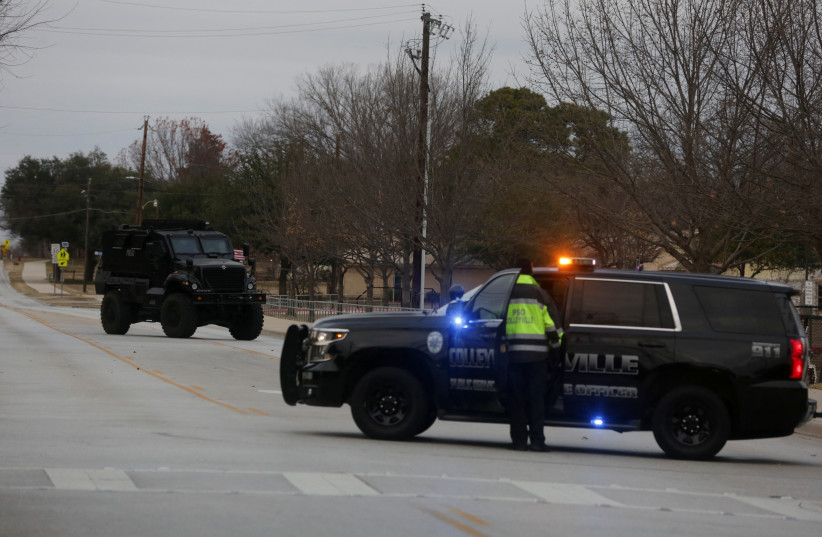Soon after the FBI freed four hostages held by a gunman named Malik Faisal Akram for 11 hours at Congregation Beth Israel in Colleyville, Texas, on Saturday, Matthew Desarno, the special agent in charge of the FBI Dallas Field Office, made a truly baffling statement.
“We do believe from our engagement with this subject that he was singularly focused on one issue, and it was not specifically related to the Jewish community. But we are continuing to work to find [the] motive,” he said.
The idea that any attack on a synagogue is “not specifically related to the Jewish community” is absurd enough.
Even with the broadest definition of who is considered Jewish, Jews make up only 2.4% of all American adults and only 0.6% of the population of Texas. It beggars belief, in most cases and in this one in particular, that someone outside the densest Jewish populations in America would have randomly stumbled upon a synagogue while looking for people to hold hostage.
Add to that the fact that the gunman entered Congregation Beth Israel on a Saturday morning, when Shabbat services are held. The timing was clearly intentional.

But the specifics of this crime also show a deep current of antisemitism running through the “one issue” on which the hostage taker was “singularly focused.”
Perhaps at first glance, that issue, the release of Aafia Siddiqui, currently serving an 86-year prison sentence for attempting to murder American troops and FBI agents, does not seem to be “specifically related to the Jewish community.” But Siddiqui was a raving antisemite, and that information is readily available.
The gunman said Siddiqui was his “sister” – though apparently in ideology and not in the literal sense – and that they would meet in “Jannah,” meaning paradise, after he dies.
Siddiqui, nicknamed “Lady al-Qaeda,” was born in Pakistan and traveled to the US on a student visa in 1990. She received her PhD in neuroscience from Brandeis University, founded by the Jewish community in 1948 and named after the first Jewish justice in the US Supreme Court.
After Siddiqui was arrested in Afghanistan for her part in plotting al-Qaeda terrorist attacks in the US, UK and Pakistan, shooting at US Army troops as they detained her, she said the case against her was a Jewish conspiracy.
Siddiqui dismissed her legal defense team because she said the lawyers were Jewish, and she demanded that jurors in the trial take DNA tests to make sure they were not Israeli or Zionists, in order “to be fair.”
She also wrote a letter to then-president Barack Obama telling him that Jews “have always back-stabbed everyone who has taken pity on them and made the ‘fatal’ error of giving them shelter.”
“It is this cruel, ungrateful back-stabbing of the Jews that has caused them to be mercilessly expelled from wherever they gain strength. This is why ‘holocausts’ keep happening to them repeatedly! If they would only learn to be grateful and change their behavior!!” Siddiqui wrote.
After her conviction, Siddiqui said: “This is a verdict coming from Israel and not from America. That’s where the anger belongs.”
The likelihood of someone being so passionate about releasing Siddiqui that he would hold people hostage at gunpoint and not know of her widely reported and Wikipedia-listed views about Jews is slim.
One of the organizations that has been advocating Siddiqui’s release in recent weeks is the Council on American-Islamic Relations (CAIR). In November, CAIR’s Texas chapter and MPower Change, a Muslim activist group, hosted an online event titled “Injustice: Dr. Aafia and the 20-year legacy of America’s wars.”
In addition, CAIR San Francisco executive director Zahra Billoo told attendees during a speech she gave last November to “know your enemies.”
Speaking at a convention for American Muslims for Palestine, Billoo said: “When we talk about Islamophobia, we often think of the vehement fascists... but I also want us to pay attention to the polite Zionists, the ones that say, ‘Let’s just break bread together’... We need to pay attention to the Anti-Defamation League, we need to pay attention to the Jewish Federation, we need to pay attention to the Zionist synagogues, we need to pay attention to the Hillel chapters on our campuses.”
It must be said that CAIR national deputy director Ed Ahmed Mitchell condemned the hostage-taking in Colleyville.
“This latest antisemitic attack at a house of worship is an unacceptable act of evil,” he said. “We stand in solidarity with the Jewish community… No cause can justify or excuse this crime. We are in contact with local community leaders to learn more and provide any assistance that we can.”
We don’t know much about the hostage taker since the FBI is not releasing information. But we know that he targeted a synagogue to free a woman who did not hide her hatred of Jews. And we know a leading figure in the same organization that advocated Siddiqui’s cause put synagogues and other major Jewish organizations on a list of “enemies” who spark Islamophobia.
These seem like directions of inquiry the FBI ought to be taking seriously.
What more must it take for a crime to be viewed as “specifically related to the Jewish community?” What more needs to happen for antisemitic hate crimes to be viewed as such?
